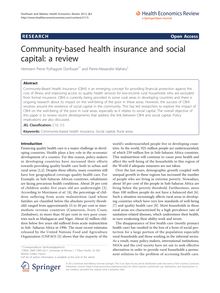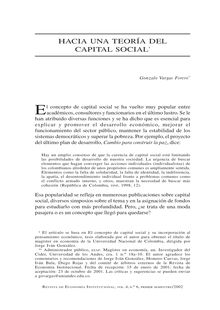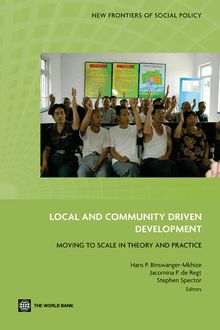#social-capital
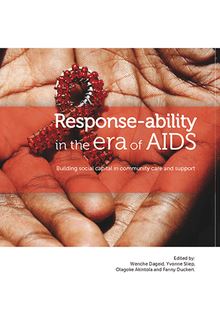
Ebooks
Response-ability in the era of AIDS: Building social capital in community care and support
F. Duckert, O. Akintola, W. Dageid, Y. Sliep
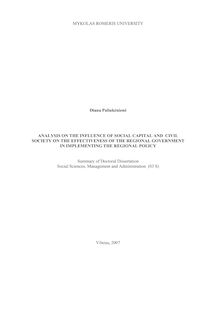
Documents
Analysis on the influence of social capital and civil society on the effectiveness of the regional government in implementing the regional policy ; Socialinio kapitalo ir pilietinės visuomenės poveikio regioninio valdymo veiksmingumui įgyvendinant regioninę politiką analizė

Documents
Savoirs
Analysis on the influence of social capital and civil society on the effectiveness of the regional government in implementing the regional policy ; Socialinio kapitalo ir pilietinės visuomenės poveikio regioninio valdymo veiksmingumui įgyvendinant regioninę politiką analizė
27 pages
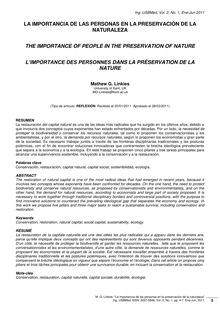
Documents
La importancia de las personas en la preservación de la naturaleza. (The importance of people in the preservation of nature).
Mathew

Documents
A multilevel analysis of social capital and self-reported health: evidence from Seoul, South Korea
Han Sehee, Kim Heaseung, Lee Hee-Sun, Lee
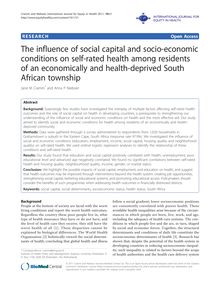
Documents
The influence of social capital and socio-economic conditions on self-rated health among residents of an economically and health-deprived South African township
Cramm, Nieboer
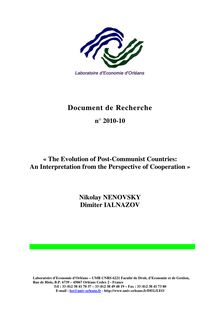
Documents
The evolution of post communist countries: An interpretation from the perspective of cooperation Dimiter Ialnazov Kyoto University kyoto u ac jp Nikolay Nenovsky University of National and World Economy Sofia LEO STUDIUM and ICER1 com Summary: The basic hypothesis we present is the following: both the transition phases and the diversity of trajectories of post communist countries are the result of the difference in prevailing strategic behaviours This difference determines the models of cooperation namely the two main archetypes that of the prisoner's dilemma and the stag hunter applied at the socioeconomic context of post communist transition These two archetypal societal models are on their part conditional on the existence of external and internal anchors While with the prisoner's dilemma that became a model of total exchange under the conditions of high social heterogeneity and broken informational channels it is profitable not to cooperate under the stag hunter model a model involving a common goal a common project advantageous in general are cooperative strategies The various countries in different phases can be approximated to either one or the other game the prisoner's dilemma or the stag hunter A shift to the cooperative game becomes possible as a result of the operation of internal or external anchors For instance in the beginning of the transition with no clear vision in sight amid an outburst of large diversity of economic and social actors and old system's information channels falling to pieces the appropriate analytical model to apply would be the prisoner's dilemma And vice versa later on especially when a decision was adopted to join the EU and with pre accession chapters being opened and closed i e an external anchor emerging appropriate for analytical reasoning becomes the stag hunter game model Résume: Les trajectoires des pays ex communistes affichent une diversité grandissante Dans ce papier nous nous proposons de le reconsidérer par la théorie de la coopération sociale Nous interprétons ...
Boris Gurov

Documents
Rapports de stage
The evolution of post communist countries: An interpretation from the perspective of cooperation Dimiter Ialnazov Kyoto University kyoto u ac jp Nikolay Nenovsky University of National and World Economy Sofia LEO STUDIUM and ICER1 com Summary: The basic hypothesis we present is the following: both the transition phases and the diversity of trajectories of post communist countries are the result of the difference in prevailing strategic behaviours This difference determines the models of cooperation namely the two main archetypes that of the prisoner's dilemma and the stag hunter applied at the socioeconomic context of post communist transition These two archetypal societal models are on their part conditional on the existence of external and internal anchors While with the prisoner's dilemma that became a model of total exchange under the conditions of high social heterogeneity and broken informational channels it is profitable not to cooperate under the stag hunter model a model involving a common goal a common project advantageous in general are cooperative strategies The various countries in different phases can be approximated to either one or the other game the prisoner's dilemma or the stag hunter A shift to the cooperative game becomes possible as a result of the operation of internal or external anchors For instance in the beginning of the transition with no clear vision in sight amid an outburst of large diversity of economic and social actors and old system's information channels falling to pieces the appropriate analytical model to apply would be the prisoner's dilemma And vice versa later on especially when a decision was adopted to join the EU and with pre accession chapters being opened and closed i e an external anchor emerging appropriate for analytical reasoning becomes the stag hunter game model Résume: Les trajectoires des pays ex communistes affichent une diversité grandissante Dans ce papier nous nous proposons de le reconsidérer par la théorie de la coopération sociale Nous interprétons ...
Boris Gurov
15 pages
English
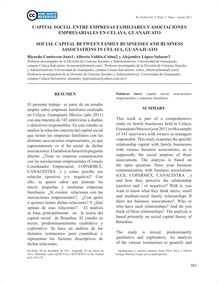
Documents
CAPITAL SOCIAL ENTRE EMPRESAS FAMILIARES Y ASOCIACIONES EMPRESARIALES EN CELAYA, GUANAJUATO (Social capital between family businesses and business Associations in Celaya, Guanajuato)
Ricardo Contreras-Soto
Collection
{{collectionTitle}}
Collection
{{collectionTitle}}
Collection
{{collectionTitle}}
{{productCategoryLabel}}
{{productTitle}}
{{productAuthors}}
{{productCategoryLabel}}
{{productThemeLabel}}
{{productTitle}}
{{productAuthors}}
{{productPages}}
{{productLanguageIsoCode}}
